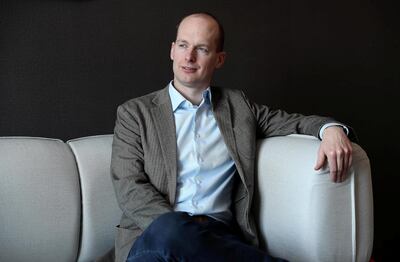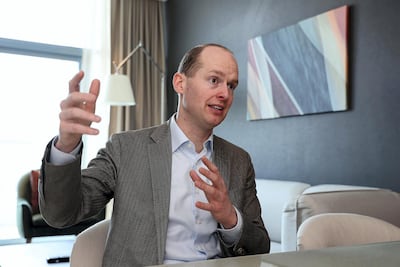The man behind a privately-funded mission to set up a colony on the Red Planet has insisted it will go ahead and the launch date is set for 2031.
Bas Lansdorp, co-founder and chief operating officer of Mars One, rebuffed criticism of a supposed human settlement and said his company is pushing ahead with the trip.
"Many challenges lie ahead. I believe we can overcome them," he said.
"Some people were orbiting space for 10 years. If people survived in space, there is no reason that forbids us from surviving on Mars."
The Mars One mission, which accepted applications from individuals across the globe to be part of the space team, is just one of a number of space programmes planned for the future.
"The cost of our mission is about US$6 billion and we have a good business case that can support the cost of such a mission. Some of the money has been collected as a €6 million-investment agreement signed with World Stock & Bond Trade Limited, a Hong Kong investment firm," said Mr Lansdorp.
The UAE is to enter the global race to explore outer space with the first Arabic-Islamic probe, which will be developed by an Emirati-only team, set to hit the Red Planet by 2021. In December, the UAE also announced its first astronaut corps, who are expected to set off for the International Space Station in 2020 after several years of intensive training.
The UAE also announced at the end of last year plans to build a Dh500 million Mars Scientific City, which will simulate life on Mars, and both India and the US have both planned upcoming missions to the moon. Unlike the other projects, however, the Mars One mission is privately-funded.

The project, he said, will generate its own revenues to fund the next steps.
“The plan was to send people to Mars by 2025; however, it took us longer to raise the initial funding. Thus, the launch date has been postponed to 2031 and landing in 2032,” said Mr Lansdorp.
When asked about criticism of the project, he said: "Not everybody can deal with such big steps. If we don't take the step and do it, it will never happen.
“There have been some critical reports and I am always keen to read them all. I learn what they misunderstood and make sure I find answers to their questions.”
“Around 200,000 people registered their interest for the selection of people to be sent to Mars and accepted the terms and conditions. More than 90 per cent of those dropped out when they found out they had to pay," said Mr Lansdorp.

"A person who does not want to pay administration fee of an average of $25 will not be entirely serious. Answering several questions and doing an online video explaining why you are the right person to join a team to live in Mars are part of the registration process.”
He said that those living in poor countries pay a smaller fee amount. "Those living in Congo will be asked to pay $5 to complete their registration. We want to make it affordable for anyone, but enough to think about it."
A total of 9,000 finished the applications completely and it was narrowed down to a 1,000. "Currently, it has been narrowed to 100 people," he said.
"The selection process was based on whether the person is a team player and has experience in multicultural activities. Afterwards, the 1,000 people had to do medical examinations to ensure they met all the requirements. The selection process was narrowed to 600 people who the selection committee interviewed and a hundred people were selected. Now, we will gather the 100 and test them for their teamwork skills," said Mr Lansdorp.
"For instance, there is water on the surface soil of Mars. Storable food will be sent to Mars for the whole two years; however, greenhouse equipment will be sent with them to enable them to grow their own food."

The Mars One COO admires the UAE's space projects. “I am familiar with the UAE’s space projects, including building a city on Mars. I am a huge fan of these projects. The more people work on exploring space, the better.”
He said that unmanned aerial systems that landed on Mars have allowed us to know what the surface of the planet looks like. "The composition of the soil, temperatures, atmosphere and we know a lot about the planet," he said.
“Whoever wants to go to Mars will have to live there forever. The return mission is practically impossible,” said Mr Lansdorp.
The unique part of the Mars One mission is to establish a permanent human settlement on the red planet.
"Going to Mars takes about seven months," said the mission's COO. "The technical aspect of the mission is extremely complex; however, our mission is permanent settlements, which means that we have to remove the additional complexity of the return mission. For a return mission, such as the one Nasa is planning, there is a need to develop larger landing systems, which requires us to develop a technology to launch something from the surface of Mars back to Earth."
Removing the idea of returning from Mars to Earth makes the process less complex, he said. "Nevertheless, it is still very complicated from a technical point of view."
“Developing the space suits to be worn by people who chose to go to Mars is still challenging. Space suits can only last for tens of hours and we need them to last much longer, and to be able to fix suits on Mars and replace components,” he said.
"A total of 60 million people are expected to visit our websites during this year. Coming up with similar estimates, we expect to be cash positive by 2019, mostly from revenues generated from the website and partnerships," said Mr Lansdorp.
_____________
Read more:
[ UAE and Indian scientists to discuss nano satellites and Mars mission plans ]
Special report: The UAE's journey into space
Dreams of Emirati teenager Alia Al Mansoori launched into space
_____________
Funding the project is much less challenging than the human aspect, however. "It is difficult to find a team who can leave everything behind to go to Mars and live for two years before the second batch of people join them. Dealing with psychological stress will be the long term challenge of Mars One," said the COO.
"We have been working on the project for six years. There are around 20 million people visiting the website and many of them contributed to what we do. Some of them make a donation to the foundation, others buy something from our web shop or apply to go to Mars," he said.
The mission's next step is to conduct contracts with aerospace suppliers, to select astronauts and draw out plans to make a documentary about the Mars project.
A documentary series will be made about the astronaut selection, the technology used and when the humans are finally living on the red planet.
Mr Lansdorp said that mankind would like to witness the adventure of those who chose to live on Mars and how they will do it.
"We do not know yet if we will be working with a broadcaster or publish the content on our website. It might be a combination of both."






